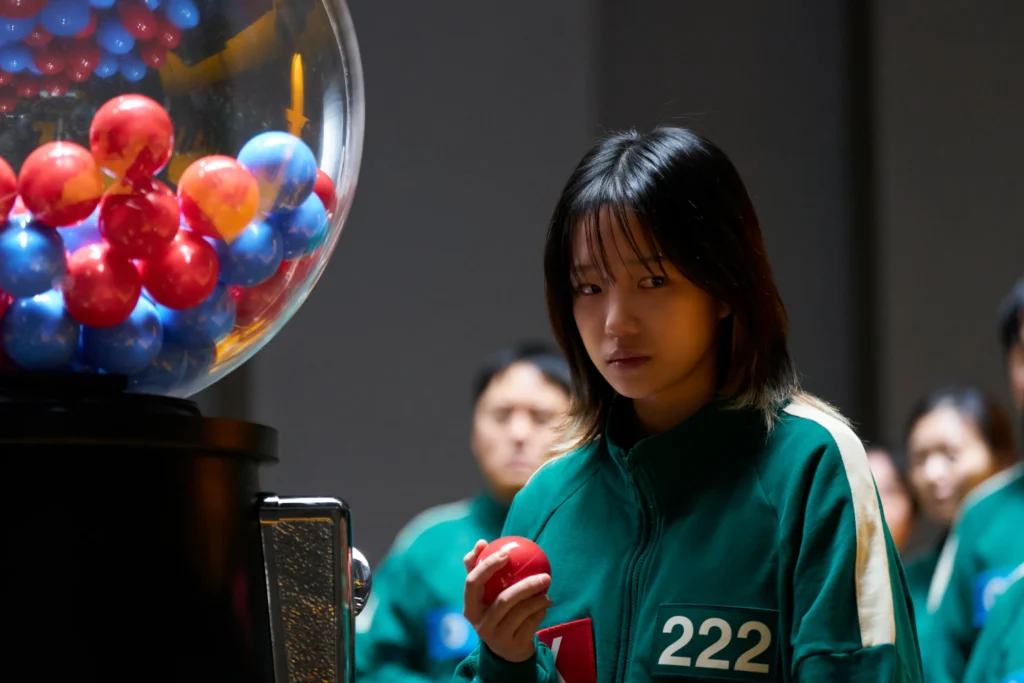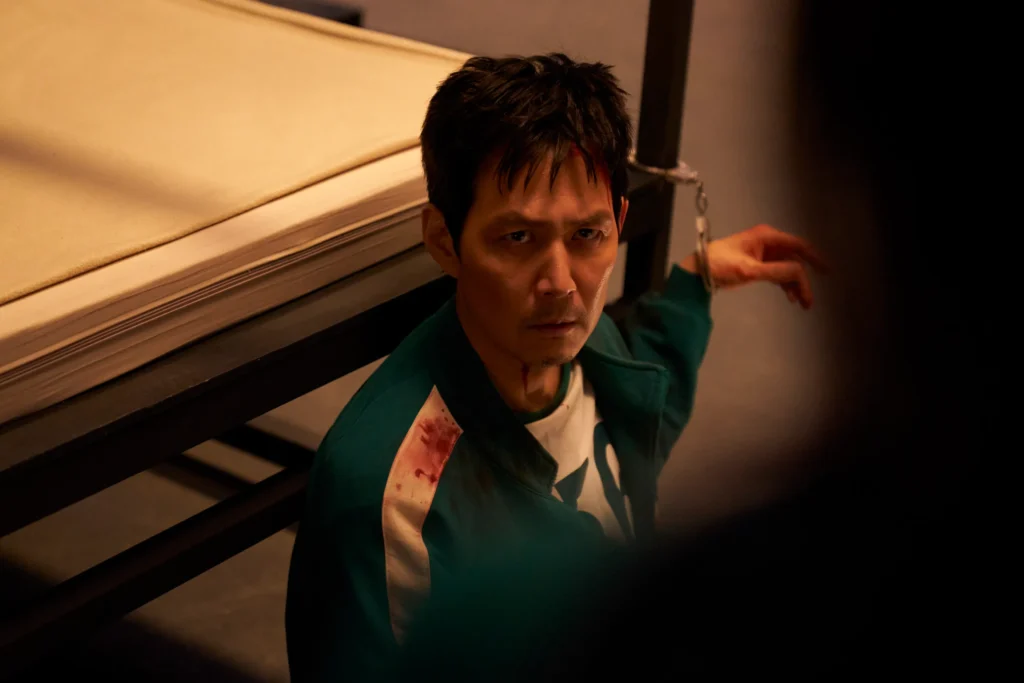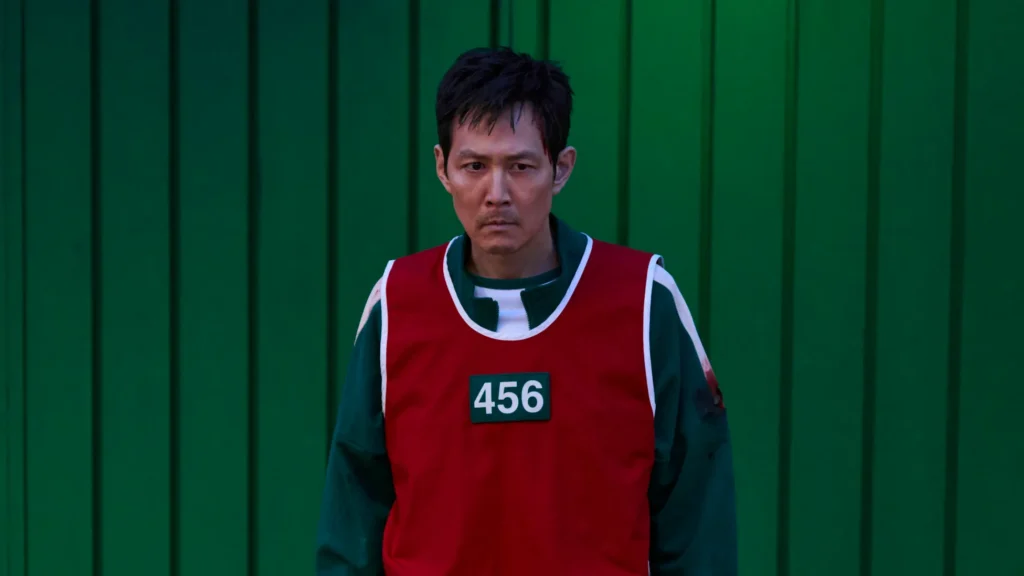
Squid Game review by reviewtechs : When Netflix dropped Squid Game in September 2021, it was impossible to ignore the cultural wave it created. From TikTok challenges to Halloween costumes, the show’s imagery and symbolism became part of the global lexicon overnight. Created by Hwang Dong-hyuk, Squid Game combines social commentary, psychological tension, and visceral violence, all wrapped in a visually arresting package. But does the hype hold up in retrospect, now that the global buzz has simmered down? Let’s dive into this survival thriller and examine whether the game is truly over—or just getting started.
Squid Game revolves around Seong Gi-hun, a debt-ridden man who is invited to participate in a series of mysterious games offering a life-changing cash prize. The catch? Each game is based on traditional Korean children’s games—with deadly consequences for those who lose. Over 456 contestants, each grappling with financial ruin, compete for ₩45.6 billion (roughly $38 million USD). But as the games progress, alliances shift, moral lines blur, and the psychological toll deepens.
One of Squid Game’s greatest strengths is its visual storytelling. From the minimalist, pastel-colored playgrounds to the hauntingly geometric masks of the guards, every frame is deliberate and loaded with symbolism. The contrast between childlike aesthetics and brutal violence is jarring and effective. The staircase reminiscent of Escher’s illusions, the giant doll in “Red Light, Green Light,” and the color-coded uniforms all carry deeper metaphorical weight—representing hierarchy, surveillance, and loss of innocence.
The core message of Squid Game is a biting critique of capitalism and class disparity. It explores how desperation can lead individuals to sacrifice their humanity, how wealth creates power imbalances, and how the system often pits the underprivileged against each other. Every contestant has a backstory rooted in economic hardship, and the games become a brutal metaphor for societal struggle.
The show also addresses themes like loyalty, betrayal, trauma, and the price of survival. It forces viewers to ask themselves: What would I do in that situation? Would I survive? At what moral cost?
Lee Jung-jae (Seong Gi-hun) delivers a multi-layered performance, transitioning from a bumbling, broken man to someone grappling with deep moral dilemmas. Park Hae-soo (Cho Sang-woo) brings complexity to a character caught between ambition and remorse. Jung Ho-yeon (Kang Sae-byeok), in her acting debut, is a breakout star, portraying vulnerability and strength in equal measure.

Even the supporting cast shines, with each character adding emotional texture to the story. The chemistry between the actors is palpable, and many scenes are emotionally gut-wrenching because of their strong performances.
The first few episodes expertly build tension while introducing characters and laying the foundation. The games start quickly, and each episode ends on a cliffhanger that keeps you binge-watching. However, the pacing begins to waver toward the end of the series. Some plot twists feel forced or overly convenient, and the final episode sparked divisive opinions among viewers.

That said, Hwang Dong-hyuk’s direction is commendable. He balances suspense with emotional depth, and even moments of stillness carry weight. The character arcs are designed to provoke thought, not just thrill.
The soundtrack, composed by Jung Jae-il, is haunting and effective. Tracks like “Way Back Then” use classical arrangements to juxtapose the brutal visuals, adding to the surreal horror. The recurring musical motifs elevate the psychological intensity and often foreshadow character fates. The sound design during the games—especially the silence before an explosion or the eerily cheerful announcements—contribute significantly to the suspense.
What Worked ?
- Unique Concept: Childhood games with fatal consequences is a fresh, unsettling idea.
- Cultural Impact: It transcended language barriers and triggered global discussions.
- Emotional Depth: Characters are more than pawns; their stories resonate deeply.
- Cinematography: Visually arresting sets and color palettes.
- Strong Acting: Stellar performances by both seasoned actors and newcomers.
What Fell Short ?
- Pacing Issues: The second half slows down with some unnecessary detours.
- Predictability: Some twists are predictable or not fully explained.
- Clunky Ending: The finale left many viewers unsatisfied or confused.
- Side Characters: Some potentially interesting characters were underdeveloped.
Squid Game is more than just a viral sensation—it’s a haunting reflection of modern society’s darkest realities. While not perfect, the show succeeds in its core mission: to entertain while provoking thought. It’s brutal yet poetic, flashy yet profound. Whether you’re in it for the social commentary, the psychological tension, or the sheer thrill of the games, Squid Game delivers a knockout punch.
Rating: 8.5/10
FAQs About ‘Squid Game’
1. Is Squid Game based on a true story?
No, Squid Game is a fictional story created by Hwang Dong-hyuk. However, its themes of financial despair and societal inequality are inspired by real-world issues.
2. Why is the show called Squid Game?
The title comes from a real Korean children’s game involving offense and defense on a squid-shaped board. It also symbolizes the winner-takes-all nature of the show’s deadly competition.
3. Who is the Front Man in Squid Game?
The Front Man is revealed to be a former winner of the game, now overseeing it. His identity and motives add a layer of complexity to the show’s critique of power structures.
4. What is the significance of the shapes on the masks?
The circles, triangles, and squares represent a hierarchy among the guards, similar to military ranks. It’s also a nod to video game or game controller symbols.
5. Is Squid Game appropriate for children?
No. Despite its childlike visuals, the show contains graphic violence, adult themes, and intense emotional scenes. It is rated TV-MA (Mature Audience).
6. Why did the ending of Squid Game divide viewers?
Some viewers felt the ending was anticlimactic or confusing. Others appreciated its philosophical implications and setup for a possible second season.
7. Are the games based on real Korean children’s games?
Yes, most of the games like “Red Light, Green Light” and “Squid Game” are real games played by Korean children, adding a cultural twist to the story.
8. Is there going to be a Season 2?
Yes, Netflix officially confirmed Squid Game Season 2 is in development, with a continuation of Seong Gi-hun’s story and new games.
9. Why did the show become so popular globally?
Its unique premise, emotional storytelling, and relatable social commentary resonated with global audiences, boosted by Netflix’s international platform.
10. What language is Squid Game in, and is dubbing/subtitle recommended?
The original language is Korean. Many viewers recommend watching it with subtitles instead of dubbing to preserve the authenticity of the performances.
If you haven’t watched Squid Game yet, be warned—it’s an emotional rollercoaster that asks more questions than it answers. But maybe, that’s the point. In the end, it’s not just about who wins the game, but what the game reveals about all of us.

